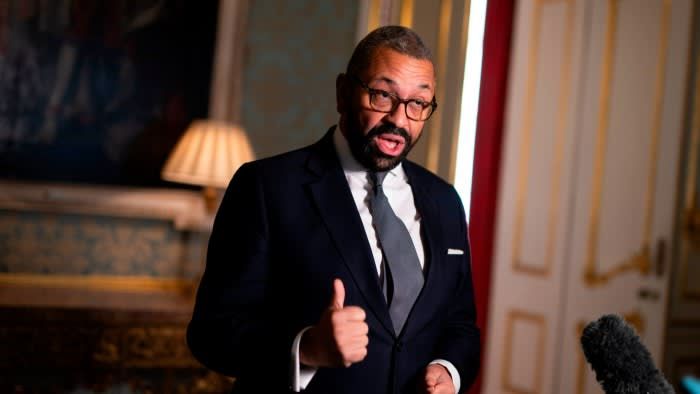James Cleverly to sign new Rwanda treaty in effort to revive UK asylum plan

Get complimentary access to the Editor's Digest without any charges.
Every week, Roula Khalaf, the Editor of the Financial Times, chooses her preferred stories and includes them in a newsletter.
The UK's Home Secretary, James Cleverly, will sign an updated agreement with Rwanda tomorrow. This move aims to resolve the legal obstacle preventing the UK government from deporting asylum seekers to Rwanda.
As per the rules, individuals who are sent to Rwanda will be allowed to stay there on a permanent basis, even if their request for asylum has been rejected. This information was shared with three individuals who have knowledge about the matter.
The latest agreement is set to tackle the verdict of the UK's top court which deemed the Rwanda strategy illegal. This will subsequently open up an opportunity for Cleverly to implement quick and immediate measures through new legislation in Parliament, with an aim to revive the policy.
Last month, the Supreme Court decided that sending asylum seekers to the east African country could put them in danger as their claims might not be assessed properly. The Court also pointed out that there was no proper way for appeals in the country, adding to the concerns. The decision was unanimous.
The fresh agreement between the UK and Rwanda will take the place of a previous understanding that was not legally binding on an international level.
To make appeals stronger, they will establish a separate judiciary group to investigate asylum applications that have been refused. This team will consist of a minimum of one judge from Rwanda and one from the Commonwealth, as per sources briefed on the agreement.
Cleverly arrived in Kigali on Monday night and stated that Rwanda is a secure nation. He emphasized that they are swiftly working on establishing a partnership to combat the use of boats and ultimately save more lives.
The highest court acknowledged that modifications might be made later on to tackle the findings they arrived at - and that's precisely what we intend to accomplish collectively with this novel, globally sanctioned treaty accord.
Robert Jenrick, the minister responsible for immigration, expressed his assurance to Sky news that flights would transport asylum seekers to Rwanda prior to the upcoming general election.
Yvette Cooper, who holds the position of shadow home secretary, rejected the action as nothing more than a temporary attention-grabbing strategy.
Entering into an agreement with Rwanda does not automatically solve the UK government's problematic proposal to transfer asylum seekers to a different country. Instead, it may kick off fresh rounds of political and legal debate.
Cleverly plans to propose a new law in the House of Commons, which could happen as soon as this week. The proposed law aims to allow parliament to officially declare Rwanda as a "safe" place. However, it's anticipated that this claim will face legal opposition.
There is disagreement among Conservative Members of Parliament regarding the inclusion of a contentious "notwithstanding" clause in the latest legislation. This clause would effectively exempt the UK from its obligations to uphold human rights both at home and abroad concerning its policy towards Rwanda.
During the previous week, over 20 members of the Conservative Party in the UK sent a letter to the Prime Minister, Rishi Sunak. They cautioned that they would not endorse a particular proposal, which Jenrick and former home secretary Suella Braverman were advocating for.
During his visit to Kigali, Cleverly will meet foreign affairs minister Vincent Biruta, and they are expected to sign the treaty. The Home Office stated that various other countries, such as Austria, Italy, Germany, and Denmark, are also considering the idea of sending migrants to a "safe third country."
In the previous year, a noteworthy "migration and economic development partnership" was signed by the UK and Rwanda, as stated by Sunak. Under this agreement, those who arrive in Britain through small boats will be resettled in Rwanda.
The United Kingdom has already given the Rwandan government £140 million for the project, with the majority of the money being allocated for development funding.
The policy has faced legal obstacles and is strongly disputed. A member of the government cabinet exclaimed, "It's impossible for anyone to be deported to Rwanda before the next election."
According to Cooper, the government is sending a greater number of home secretaries to Rwanda than refugees seeking asylum.
The speaker told Sky News that the current home secretary is the third person to hold the position within a span of two years. She expressed her disapproval of the home secretary's trip to Rwanda with yet another checkbook, stating that they have already spent £140 million. The exact amount spent this year has not been disclosed, and there are promises to spend more money again next year.
She stated that the existing plan is inadequate as it only aims to address a few hundred individuals, but over a thousand people have arrived in the past week. These individuals are not being targeted by the plan and criminal organizations are profiting from these illicit border crossings.









































